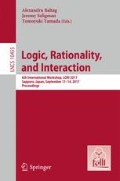Abstract
One of the simple approaches to paraconsistent logic is in terms of three-valued logics. Assuming the standard behavior with respect to the “classical"values, there are only two possibilities for paraconsistent negation, namely the negation of the Logic of Paradox and the negation of Sette’s logic P \(^1\). From a philosophical perspective, the paraconsistent negation of P \(^1\) is less discussed due to the lack of an intuitive reading of the third value. Based on these, the aim of this paper is to fill in the gap by presenting a semantics for P \(^1\) à la Jaśkowski which sheds some light on the intuitive understanding of Sette’s logic. A variant of P \(^1\) known as I \(^1\) will be also discussed.
Access this chapter
Tax calculation will be finalised at checkout
Purchases are for personal use only
Notes
- 1.
These definitions can be found in [16].
- 2.
The original axiomatization had one more axiom \({\sim }(A\rightarrow {\sim }{\sim }A)\rightarrow A\) which was later proved to be redundant. See, for example, [16].
- 3.
Note however that the main result of Ciuciura contains a mistake, as pointed out in [19]. Therefore, the variant of D \(_2\) remains to be explored further.
- 4.
I would like to thank one of the reviewers for directing my attention to the result by Kooi and Tamminga reported in [14].
- 5.
This was a worry of one of the reviewers.
- 6.
The details are left for interested readers.
- 7.
Recall here that we may obtain the four-valued semantics in which the disagreement case will be split into two cases depending on which of the two discussants is seeing the proposition as true.
References
de Araujo, A.L., Alves, E.H., Guerzoni, J.A.D.: Some relations between modal and paraconsistent logic. J. Non-Class. Logic 4(2), 33–44 (1987)
Arieli, O., Avron, A., Zamansky, A.: Maximal and premaximal paraconsistency in the framework of three-valued semantics. Stud. Logica. 97, 31–60 (2011)
Baaz, M.: Kripke-Type Semantics for Da Costa’s Paraconsistent Logic C\(_\omega \). Notre Dame J. Formal Logic 27(4), 523–527 (1986)
Béziau, J.-Y.: The paraconsistent Logic Z-A possible solution to Jaśkowski’s problem. Logic Logical Philos. 15, 99–111 (2006)
Carnielli, W.A., Lima-Marques, M.: Society semantics and multiple-valued logics. In: Contemporary Mathematics, vol. 235, pp. 33–52. American Mathematical Society (1999)
Ciuciura, J.: A quasi-discursive system ND\(_2^+\). Notre Dame J. Formal Logic 47, 371–384 (2006)
Ciuciura, J.: Frontiers of the discursive logic. Bull. Sect. Logic 37(2), 81–92 (2008)
da Costa, N.C.A.: On the theory of inconsistent formal systems. Notre Dame J. Formal Logic 15, 497–510 (1974)
Dunn, M.: Intuitive semantics for first-degree entailments and ‘coupled trees’. Philos. Stud. 29(3), 149–168 (1976)
Gordienko, A.B.: A paraconsistent extension of Sylvan’s logic. Algebra Logic 46(5), 289–296 (2007)
Jaśkowski, S.: Propositional calculus for contradictory deductive systems. Stud. Logica 24, 143–157 (1969)
Jaśkowski, S.: A propositional calculus for inconsistent deductive systems. Logic Logical Philos. 7, 35–56 (1999)
Jaśkowski, S.: On the discussive conjunction in the propositional calculus for inconsistent deductive systems. Logic Logical Philos. 7, 57–59 (1999)
Kooi, B., Tamminga, A.: Three-valued logics in modal logic. Stud. Logica 101(5), 1061–1072 (2013)
Lewin, R.A., Mikenberg, I.F., Schwarze, M.G.: Algebraization of paraconsistent logic P\(^1\). J. Non-Class. Logic 7(1/2), 145–154 (1990)
Marcos, J.: On a problem of da costa. In: Essays on the Foundations of Mathematics and Logic, pp. 53–69. Polimetrica (2005)
Nasieniewski, M., Pietruszczak, A.: On the weakest modal logics defining Jaśkowski’s logic D\(_{2}\) and the \(\text{ D }_2\)-consequence. Bull. Sect. Logic 41(3–4), 215–232 (2012)
Nasieniewski, M., Pietruszczak, A.: On modal logics defining Jaśkowski’s D2-consequence. In: Tanaka, K., Berto, F., Mares, E., Paoli, F. (eds.) Paraconsistency: Logic and Applications. Logic, Epistemology, and the Unity of Science, vol. 26, pp. 141–161. Springer, Dordrecht (2013). doi:10.1007/978-94-007-4438-7_9
Omori, H., Alama, J.: Axiomatizing Jaśkowski’s Discussive Logic D\(_2\) (under review)
Priest, G.: The logic of paradox. J. Philos. Logic 8(1), 219–241 (1979)
Pynko, A.P.: Algebraic study of Sette’s maximal paraconsistent logic. Stud. Logica 54(1), 89–128 (1995)
Sette, A.: On the propositional calculus P\(^1\). Math. Japonicae 16, 173–180 (1973)
Sette, A., Carnielli, W.: Maximal weakly-intuitionistic logics. Stud. Logica 55, 181–203 (1995)
Waragai, T., Omori, H.: Some new results on PCL1 and its related systems. Logic Logical Philos. 19(1–2), 129–158 (2010)
Waragai, T., Shidori, T.: A system of paraconsistent logic that has the notion of “behaving classically” in terms of the law of double negation and its relation to S5. In: Béziau, J.Y., Carnielli, W.A., Gabbay, D. (eds.) Handbook of Paraconsistency, pp. 177–187. College Publications (2007)
Acknowledgments
Hitoshi Omori is a Postdoctoral Research Fellow of Japan Society for the Promotion of Science (JSPS). I would like to thank the anonymous referees for their kind and helpful comments that improved the paper substantially. I would also like to thank audiences at Prague Seminar on Paraconsistent Logic for useful comments and discussions.
Author information
Authors and Affiliations
Corresponding author
Editor information
Editors and Affiliations
Rights and permissions
Copyright information
© 2017 Springer-Verlag GmbH Germany
About this paper
Cite this paper
Omori, H. (2017). Sette’s Logics, Revisited. In: Baltag, A., Seligman, J., Yamada, T. (eds) Logic, Rationality, and Interaction. LORI 2017. Lecture Notes in Computer Science(), vol 10455. Springer, Berlin, Heidelberg. https://doi.org/10.1007/978-3-662-55665-8_31
Download citation
DOI: https://doi.org/10.1007/978-3-662-55665-8_31
Published:
Publisher Name: Springer, Berlin, Heidelberg
Print ISBN: 978-3-662-55664-1
Online ISBN: 978-3-662-55665-8
eBook Packages: Computer ScienceComputer Science (R0)


